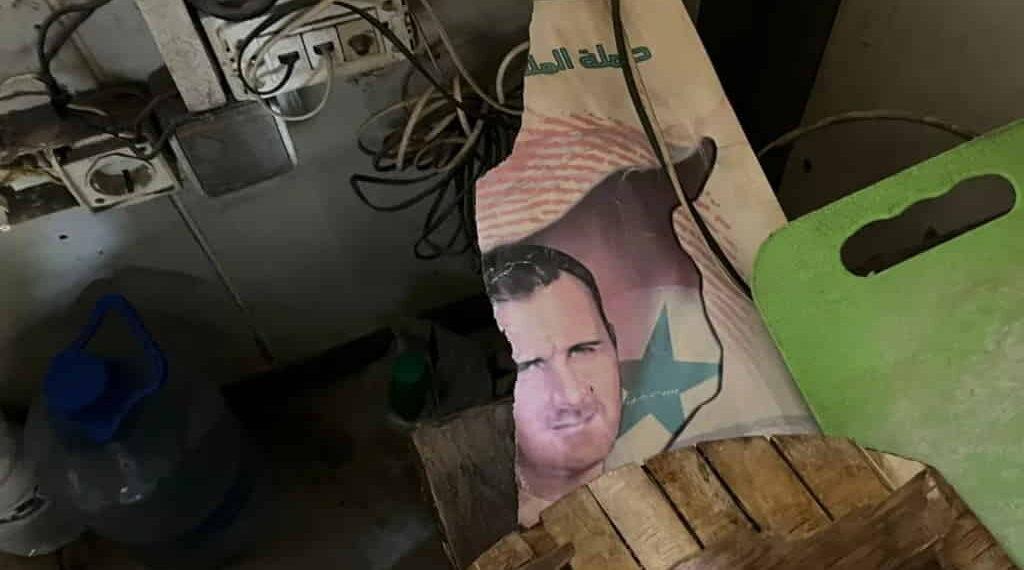Inside the Abandoned Homes of Assad’s Brutal Enforcers
Jamil Hassan, one of Bashar al-Assad’s most feared enforcers, fled Syria in a rush, leaving behind the marks of his ruthless reign. The 72-year-old, wanted for his role in the torture and killing of civilians, was seen trembling as he exited his apartment building in a small convoy, accompanied by family and security guards, with only a few suitcases. A neighbor and her teenage son watched him leave, realizing that this was a sign of Assad’s fall.
When investigators entered Hassan’s apartment days later, they found the traces of his hasty departure: a half-eaten carrot cake still on the table, clothes scattered across the beds, and wilting flowers on the dining table. Cups and plates were left to dry by the sink, and a framed photo of Hassan with Assad hung in the study, with the words: “Our skies are for us and forbidden to others.”
Hassan, known as “the butcher” by many, was a key figure in the regime. As the head of Air Force Intelligence, he oversaw the brutal torture of detainees at notorious facilities like Mezzeh Prison. He is just one of many senior figures from the Assad regime who have fled their homes in affluent areas of Damascus. Now, these men, once feared for their power and cruelty, are difficult to locate, and some may have already struck deals to avoid justice.
Fleeing the Collapse of the Regime
On Hassan’s street, residents recall the eerie silence as his guards suddenly abandoned their posts. Amr al-Bakri, a filmmaker who lived next door, described the night before the regime’s collapse as a moment when the constant military presence disappeared. “It was the first time I’d seen this post with no lights, no sounds,” he said.
Residents had lived in fear of Hassan’s brutal methods. One neighbor shared that Hassan’s guards once threatened to kill her dog if it didn’t stop barking. Another woman recalled that the guards would inspect the bags of anyone visiting the building. “We knew what he did to the Syrians… but we couldn’t say anything,” said Amr, reflecting on the terror they felt living next to such a powerful and feared figure.
International Warrants and Impunity
Hassan, whose cruelty is documented worldwide, is wanted for war crimes in countries like the US, France, and Germany. He is accused of conspiring to commit heinous acts against civilians, including the torture of detainees. His regime’s violent suppression of protests in 2011 left at least 43 dead, as reported by the US.
Despite these grave charges, Hassan’s sudden departure, along with other key Assad officials, presents a new challenge: where did they go? Some speculate that they have escaped to allied countries or are hiding in Syria, evading justice through political deals.
The Hunt for Assad’s Enforcers
The group Hayat Tahrir al-Sham (HTS), which has led efforts to challenge Assad’s regime, has pledged to hunt down these figures. Rebels now occupy Hassan’s former apartment and have posted a note warning others not to enter. When asked about Hassan’s whereabouts, one rebel smiled and remarked, “I don’t know — to Hell.”
Other homes belonging to regime officials, like that of Hussam Luka, the head of the General Security Directorate, have also been abandoned. Rebels found his apartment stripped of valuable items, yet photos of Luka with Assad and various medals were left behind.
Luka, under sanctions by the EU, US, and UK, is notorious for his role in torturing political opponents and orchestrating massacres. He is one of several high-ranking figures with information about the whereabouts of missing American journalist Austin Tice, for whom there are still hopes of accountability.
Lavish Homes, Decadence Amidst War
The homes of Assad’s associates, like Khodr Taher Bin Ali, a businessman with deep ties to the regime, offer a striking contrast to the violence they helped perpetuate. Bin Ali’s lavish home, complete with a gym, indoor swimming pool, and golden safes, was left behind. Inside, luxury items like watches, jewelry, and children’s toys remained, a symbol of the excess enjoyed by the regime’s elite while the Syrian people suffered.
In the neighboring areas, the homes of other regime figures are now being occupied by rebels. Some have transformed these once-grand apartments into military bases. One rebel described how they now sleep on blankets under chandeliers, using camp stoves to cook in kitchens once filled with luxury appliances. At another, a child peeked out from a lavish apartment with an outdoor pool, now home to a family in exile.
The Ongoing Search for Justice
The hunt for Assad’s enforcers will not be easy. While many of these figures have likely escaped, some may still be in Syria, hiding in plain sight. Neighbors suspect Hassan may have sought refuge in Lebanon, where Hezbollah, a key ally of Assad’s regime, is rumored to have assisted in smuggling high-ranking officials across the border.
Despite these challenges, there is a global call for justice. The Syrian Center for Media and Freedom of Expression emphasizes that holding these men accountable will require international cooperation and significant resources. The hope is that justice will prevail and that these men will face punishment for their crimes, either in Syria or through international courts.
As one neighbor put it, “We hope he will one day be returned to Syria… to be punished.”
This article was rewritten by JournosNews.com based on verified reporting from trusted sources. The content has been independently reviewed, fact-checked, and edited for accuracy, neutrality, tone, and global readability in accordance with Google News and AdSense standards.
All opinions, quotes, or statements from contributors, experts, or sourced organizations do not necessarily reflect the views of JournosNews.com. JournosNews.com maintains full editorial independence from any external funders, sponsors, or organizations.
Stay informed with JournosNews.com — your trusted source for verified global reporting and in-depth analysis. Follow us on Google News, BlueSky, and X for real-time updates.














